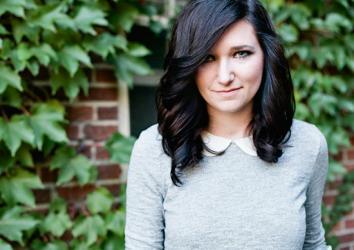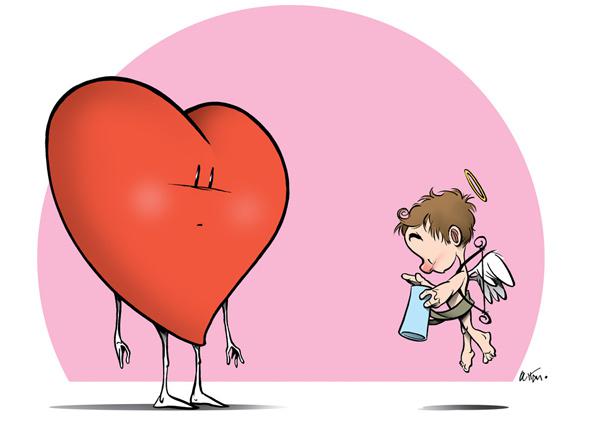The secret of the game “Never have I ever” is that while it seems to revolve around guys—guys you’ve liked, guys you’ve kissed or slept with—it is actually all about girls. It is a female bonding ritual built on revelations of petty rule-breaking and humiliation. So too with Never Have I Ever, Katie Heaney’s breezy memoir. While this first book, by an editor at BuzzFeed, ostensibly chronicles her “life (so far) without a date,” it is most moving as a tribute to girl-girl friendship.
At 25, Heaney has never had a boyfriend. Her memoir runs through the crushes and candidates, almosts and also-rans, most of them quickly forgotten. But the heart of it lies with the women—friends from K–12, college, and grad school who are meaningful constants. The book opens and closes with Heaney’s best friend Rylee, a “lighthouse person,” “magnetic and luminescent,” in whose steady glow the men wheel by, ephemeral as shadow puppets. We too are offered VIP access to Heaney’s social circle: “That’s what I hope this book feels like,” she writes. “You and I are hanging out, and I am drinking too much and talking to you—about my most embarrassing adventures in flirting and kissing and liking boys—for a really long time. You are such a good listener. I mean it.”
Thanks Katie! I am already a little light-headed from the wine – or is it the charm offensive? I know Heaney is a consummate friend, because she told me. “I’m not trying to be self-righteous about this,” she says, “but I am literally the best friend a person could ask for and I am a good listener and anybody who doesn’t want to be my friend should take a long, hard look at him/herself and whisper, ‘What is wrong with me? Why was I born without the capacity to love?’ ” And I believe her!
Never Have I Ever arrives at a literary moment in which people are obsessed with the likability (or lack thereof) of female characters. Rebecca Mead’s New Yorker profile of Jennifer Weiner revived a conversation that began when author Claire Messud lashed out at an interviewer for suggesting that her fiery protagonist in The Woman Upstairs was not BFF material. “Would you want to be friends with Humbert Humbert?” Messud snapped. “Would you want to be friends with Mickey Sabbath? Saleem Sinai? Hamlet? … If you’re reading to find friends, you’re in deep trouble.” Since then, the Internet has been roiling with efforts to define “likability,” a quality seemingly bound up in friendship. Is it a “very elaborate lie, a performance?” Being “pleasing or appropriate?” Something more fluid and personal?
Whatever it is, Heaney possesses it in spades. Her memoir, which takes as its subject liking and being liked, has all of the easygoing, intimate cheerfulness that verb implies. Behold the book’s first sentence, which reads: “I would like to tell you about a theory I’ve developed, in the past two years or so, about a certain brand of people I like to call ‘lighthouses.’ ” (emphasis mine) Our narrator is the type of person who likes things—a likable trait!—and in return she commands our sympathies, our liking.
Reading the book, I started to wonder how I ended up analyzing the disastrous dating history of this warm, smart, adorable person, who says funny things like “I obviously enjoyed the idea of a boyfriend as some vague and theoretical concept that kissed me beneath weather elements.” At times, Heaney seems too upbeat to compel our empathy, too appealing to repel guys the way she says she does. I understand why Never Have I Ever insists on her pleasingness: A diary of amatory stalemate (“total romantic failure,” according to a Hairpin interview), on some level it needs us to believe that its heroine’s singledom is not her fault. Yet the idea that Heaney would require any kind of defense is crazy-making! It contradicts the whole spirit of the book.
I have a snobby desire to dismiss Never Have I Ever as unserious. Not because it concerns a nice girl looking for love or uses an informal writing style (lots of CAPS and ugh and other blog- and text-speak), but because it seems underrevelatory even for what it wants to be. One danger of a perpetual charisma attack is that voiceiness can come to stand in for epiphany. The stakes are almost nonexistent. “Not having a boyfriend at any given moment bothers me very little,” Heaney writes toward the beginning. “Not having ever had one bothers me only slightly more.” (So why are we reading?) And the way singleness tends to emerge as a better alternative to dating’s sacrifices and delusions is fair, even refreshing—but, again, hardly conducive to a lot of sympathetic nail-biting.
I don’t mean to suggest that any book about singleness needs to take the form of a sad-sack lament. (That would be terrible.) But Heaney is living out what seems like the Disney World version of her premise: Her life is crammed with friends, interests, and colorful adventures. Her “humiliations” are molehills. (A drunk girl once yelled at her at a party, and this is “karma … [taking her] down a notch”?) Her alleged social awkwardness looks from here like normal interaction. It is not hard to imagine others in her situation avoiding relationships for reasons she never mentions: physical or mental illness, a family issue, trauma, all the scary and serious winds that can blow you off the path of “normal development.” While faulting Heaney for not acknowledging these alternatives is probably going too far, anyone hoping to find a reflection of a darker lived experience in Never Have I Ever will probably just feel weird and monstrous all over again.

Photo courtesy Louisa Podlich
Plus, the memoir makes you long for some sort of broader contextualization, some deeper meaning. I got excited when I saw in the table of contents that Heaney had titled her introduction “To the Lighthouse” and her epilogue “25 Years of Solitude,” because I thought it meant Heaney planned to splice her anecdotes with other voices, other ways of imagining womanhood, loneliness, freedom, and love. But Woolf and Marquez don’t make the cut; the book stays within its circle; its allusions are just puns. “It happens more often as I get older that I realize I live in a girl bubble of my own making,” Heaney writes. The interior of said bubble is lovely—but we’d get a better view of its shape and scope if she wandered outside occasionally.
Still, the memoir brims with sharp observations, like how girls will laugh and talk extra loudly around an alluring guy, as if to remind him that they are girls! Alive! In his presence! (Heaney coins the phrase “seduction by osmosis”—you know you’ve done it. ) Or how everyone who works at a coffee shop “is at least a little bit hot.” Or how—to move away from romantic examples—a recent grad can yearn for school as the place where “I had goals I actually understood.” There is poignancy here, too, and thoughtfulness. Heaney brings her off-kilter perspective to bear on a friendship that can’t quite make the leap into something more: “I was feeling bad about feeling unsure when everything on paper said I should have been in love,” she writes. “The problem is that paper just isn’t all that trustworthy. You can write basically anything on it.”
It might be the book’s most profound moment. You really can type anything into a flirty Facebook message, or a Word doc that will become a memoir (or a review). And those words, even if they fail to perfectly capture who you are and what you think, create their own ghostly presence. But that’s the problem: I read Never Have I Ever knowing it was a facsimile of Katie Heaney; she’s not actually drinking wine with me; we’ve never met. The more the book insisted on intimacy—with the Gchat diction and the disclaimers about total honesty—the more I felt the difference between thumbing through a paperback and having a flesh-and-blood friend. Confidential to Claire Messud: I don’t read to find soul mates, Platonic or otherwise. But the artificiality of pretending that a one-way transmission of polished language is actually a conversation made for, at least in this case, a deeply lonely experience. It was like the worst of online dating—those painstakingly “authentic” profiles—and of regular dating, in which practically everything you say is strategic. It points to all the ways we fail to really know each other—and how do you like someone you don’t even know?
There’s a poisonous strand of thinking in Internet culture that wants to tell young women their stories don’t matter—that if they have a platform, they don’t deserve it. I’m thrilled that Katie Heaney has written this book in defiance of the haters. She is challenging sexist nonsense about the “proper subjects” for memoir. But when a book fails to speak to you the way you hoped it would, it’s your prerogative to try to figure out why, and Never Have I Ever left me yearning for more insight and less performance. I’d be lying if I said I didn’t really, truly like it. But I wanted to fall in love.
—
Never Have I Ever: My Life (So Far) Without a Date by Katie Heaney. Grand Central Publishing.
See all the pieces in this month’s Slate Book Review.
Sign up for the Slate Book Review monthly newsletter.
